Finding the best ways to use a lawn or garden product can be harder than you think. For example, do you want to use Roundup on weeds throughout your landscape but believe it may be too hot or too cold? Do the active ingredients in Roundup only work during certain types of weather?
Well, we've done research into these questions and have the answers below!
When it comes to spraying Roundup, you want to do this in temperatures between 40 and 85 degrees Fahrenheit. Since the active ingredient glyphosate won't be effective in temperatures lower than 40 degrees, a mid-winter spray isn't usually recommended.
In addition, if the weather is super hot and pushing 90+ degrees, weeds will shut down, making your Roundup useless.
As we start this article, we will cover all things using Roundup and discuss what weather is best for this. If you have pesky weeds that won't die, haven't used Roundup before, or need tips and tricks for your herbicide product, we're here to help. With that said, let's dive right into this topic!
Do You Have To Spray Roundup In Certain Temperatures?
Even though you don't always think to check the temperature before spraying Roundup, your product may not work in too hot or cold conditions.
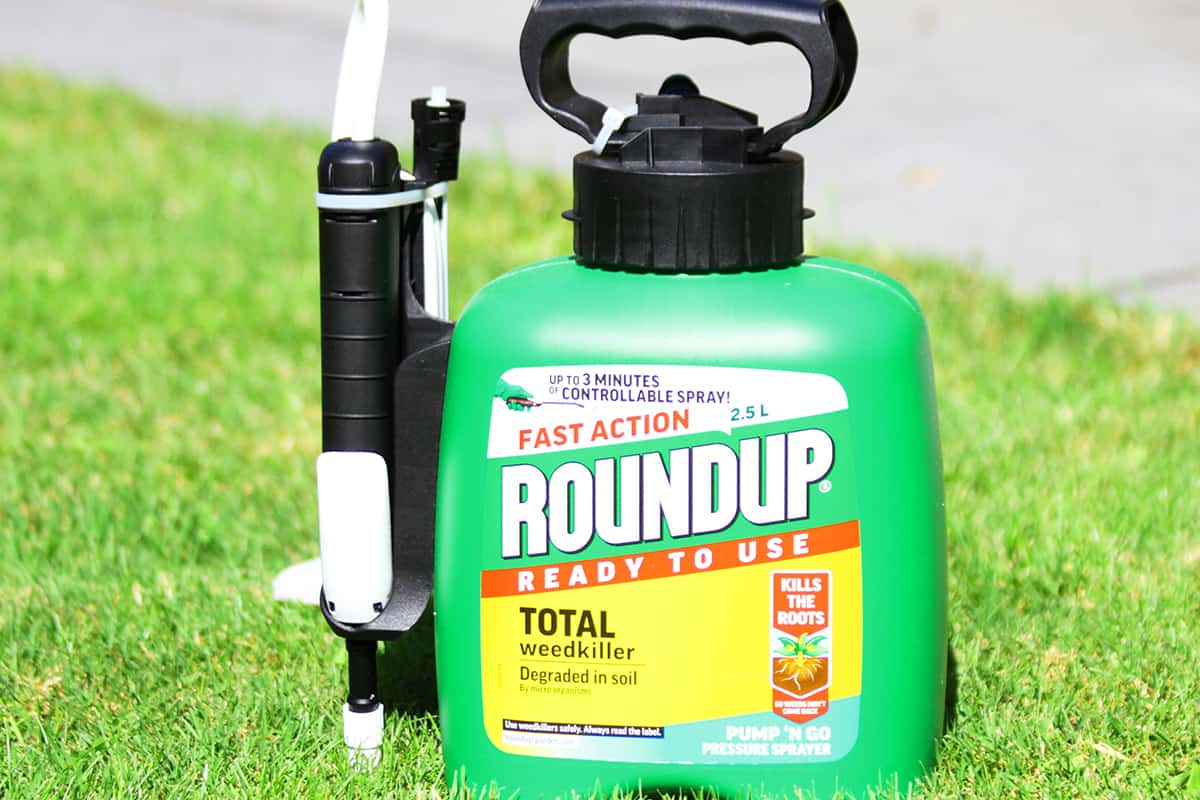
Typically, you want to apply Roundup in weather that won't drop below 40 degrees Fahrenheit or rise above 85 degrees. We say this because the active ingredient 'glyphosate' doesn't work if the temperatures are too cold or the weather gets super warm.
Weeds tend to shut down and stop growing in extreme weather. That can be during periods of intense cold or intense heat. Therefore, your Roundup needs to go on an actively growing plant.
Spraying a dormant or shocked weed won't likely kill it, which can be a waste of product. Instead, wait until the conditions improve, whether that means warmer or cooler weather.
The last thing you want to do is spray Roundup all over dormant weeds, only to have to redo this next week. Even the most persistent weeds will die when sprayed with Roundup during normal conditions, so killing them with this product shouldn't be an issue.
So remember, the milder the weather, the better your Roundup will work!
Check out our post for more info on this: When Is It Too Cold To Spray Herbicide?
How Hot Is Too Hot For Roundup?
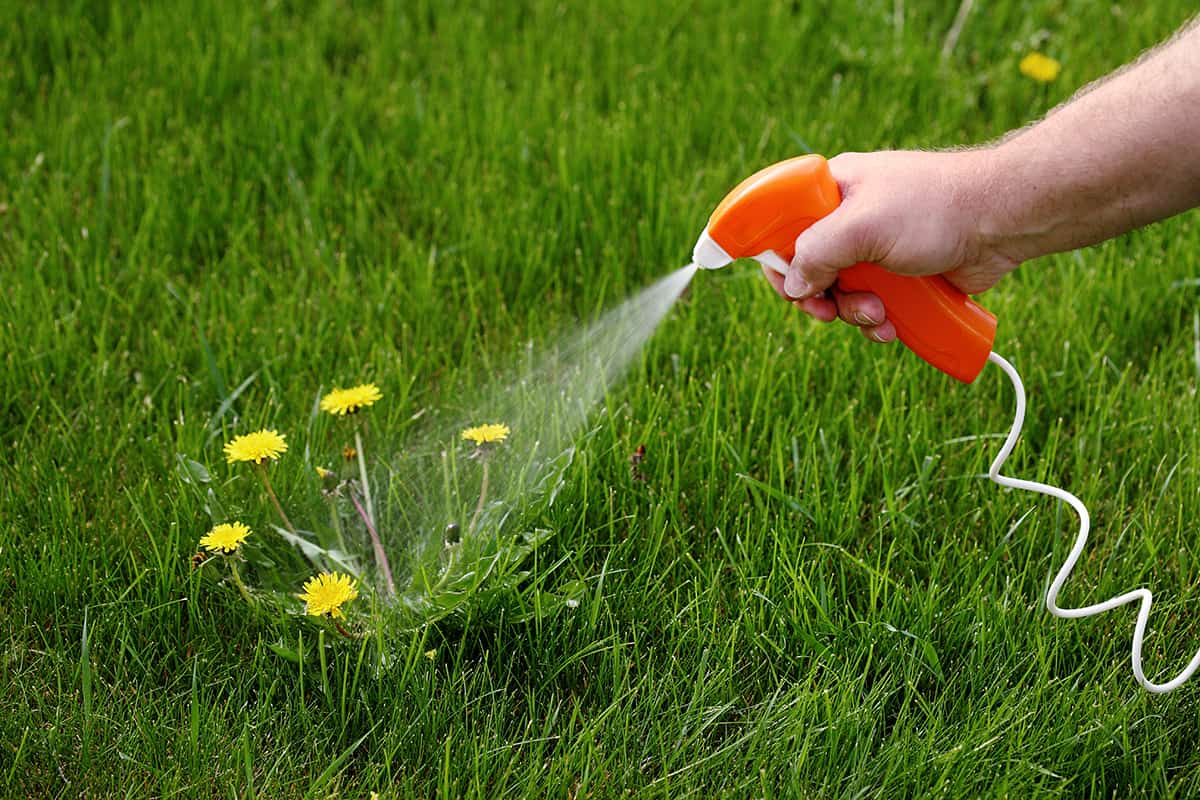
If you're worried about spraying herbicide in the heat: this can become a problem in temperatures above 85 degrees. Generally, Roundup will be effective through the spring and summer months if the conditions aren't severe.
For example, if you want to spray Roundup in 80-85 degree weather, this should be perfectly fine. Since weeds don't shut down and stop growing until the temperature reaches 90+ degrees, your herbicide will still work.
Some gardeners notice weeds in the later spring or summer, leaving them helpless if the weather gets too warm. Therefore, you want to try and locate weeds ASAP, spraying them with Roundup before conditions worsen.
Since most locations don't hit 90 degrees regularly, this can be more of a regional problem. Suppose you're in Arizona and notice weeds pop up in the summertime.
The temperatures will likely reach 90-95 degrees daily through peak summer months, deeming Roundup unusable. Someone in Washington won't have this same issue.
Why Can't I Use Roundup In The Cold?
Even though spraying Roundup in the winter sounds harmless, your product won't be effective in too low of temperatures. As we said, the active ingredient in Roundup is glyphosate.
This chemical can't target the growth enzymes of a weed in climates below 40 degrees Fahrenheit. That's because they can't penetrate the weed's cuticle.
Experts say spraying herbicides during cold weather can be especially harmful to crops. So, if you grow food in your yard and see wintertime weeds: we recommend pulling them by hand.
On top of that, spraying Roundup is best when ambient temperatures stay around 50+ degrees. Again, the milder the conditions, the better your product can attack weeds.
Roundup works at a cellular level, killing plants from the inside out. Therefore, using it during the dead of winter when the weed is dormant is ineffective.
You want your weeds alive and growing when you spray herbicide.
Can I Spray Roundup Before It Snows?
In general, we don't suggest spraying Roundup before a snowstorm. Since snow happens when temperatures drop below 32 degrees Fahrenheit, using Roundup leading up to that won't be effective.
In addition, you would need to reapply the herbicide if it snows within six hours of your application, which means more work for you.
Most Roundup products can waterproof themselves within an hour. However, if they become wet too soon, they become less potent. That can spell trouble for weeds, as they're already pretty hardy.
The key is applying Roundup when the skies are clear, and the temperatures aren't too low. Snow doesn't tend to happen out of anywhere, so double-check the forecast before spraying.
Moreover, your Roundup will include instructions with the waterproofing/weatherproofing timeline, so check that out too.
What Is The Best Time Of Year To Use Roundup?
One of the best times of year to use Roundup is spring. Since weeds need to be actively growing for Roundup to be effective, the spring is usually better for applications.
According to the brand, you want to use their herbicides in warmer conditions, which are ideal throughout springtime.
Specifically, if you have the 'Roundup® For Lawns' herbicide, they recommend waiting until "calm weather, when rain is not predicted for the next 24 hours".
As we said before, Roundup can waterproof itself within a short period, but if it snows or rains before 24 hours, the potency of your product will likely decrease.
The best idea is to plan your application for a calm day without upcoming changes to the temperature. So, even if today's weather is clear and tomorrow's calls for showers, you might want to hold off.
However, you can sometimes get away with spraying weeds in the early summer, depending on the weather.
Should You Spray Roundup In The Morning Or At Night?
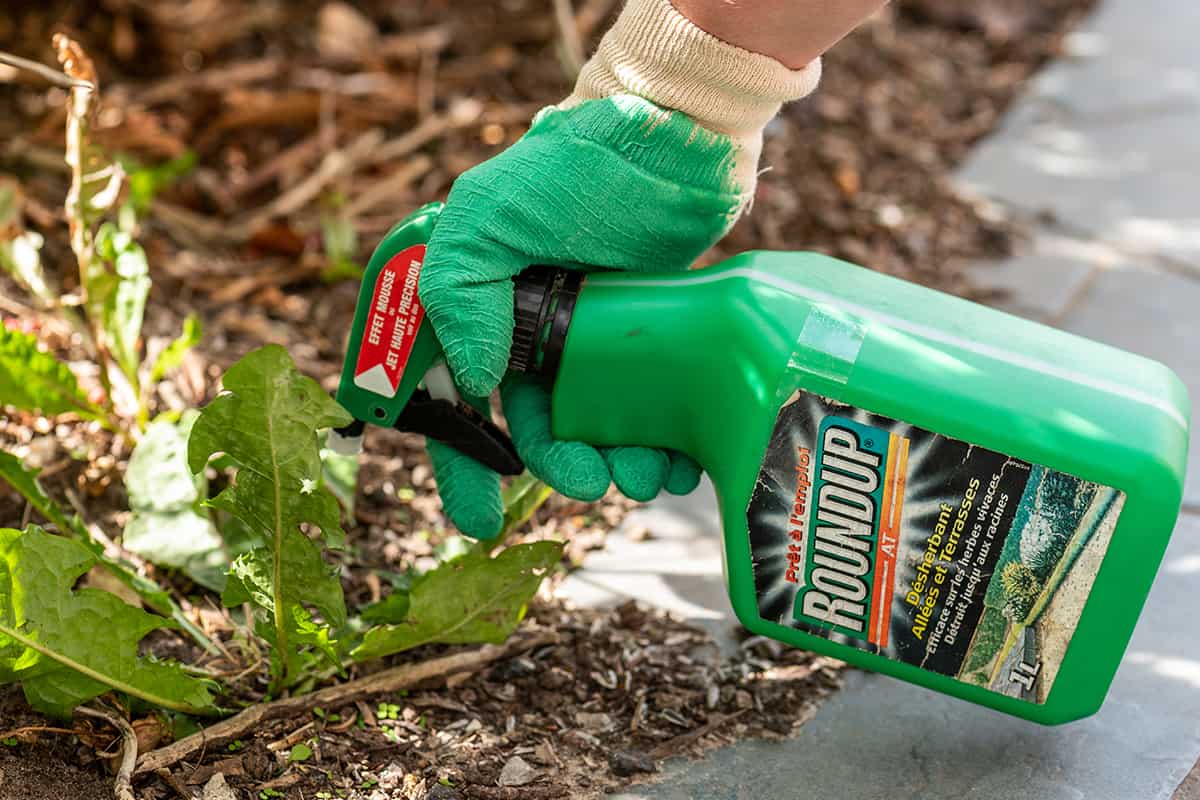
It's usually better to use Roundup towards the mid-day or evening. That's because you will better understand the daily conditions by 1-3 PM rather than winging it in the early morning.
Since Roundup can be somewhat temperamental in wind or rain, waiting until the afternoon or evening can ensure your product works as intended.
For example, if you use Roundup in the later evening, you will have enough time to settle on your weeds, starting the killing process by sunrise.
Your herbicide will also begin working effectively in the afternoon, starting its takeover by evening. One benefit of using Roundup is how quickly it activates; the entire timeline is pretty quick.
Therefore, if the conditions are good, you can let your product waterproof and get to work in the afternoon or evening. Sometimes, morning sprays get ruined by afternoon winds you didn't know were coming, or worse, a rain shower.
We also have a post on this, which you can read here: Can You Spray Roundup At Night [Or Does It Need Sunlight To Work]?
Can I Use Roundup In The Fall?
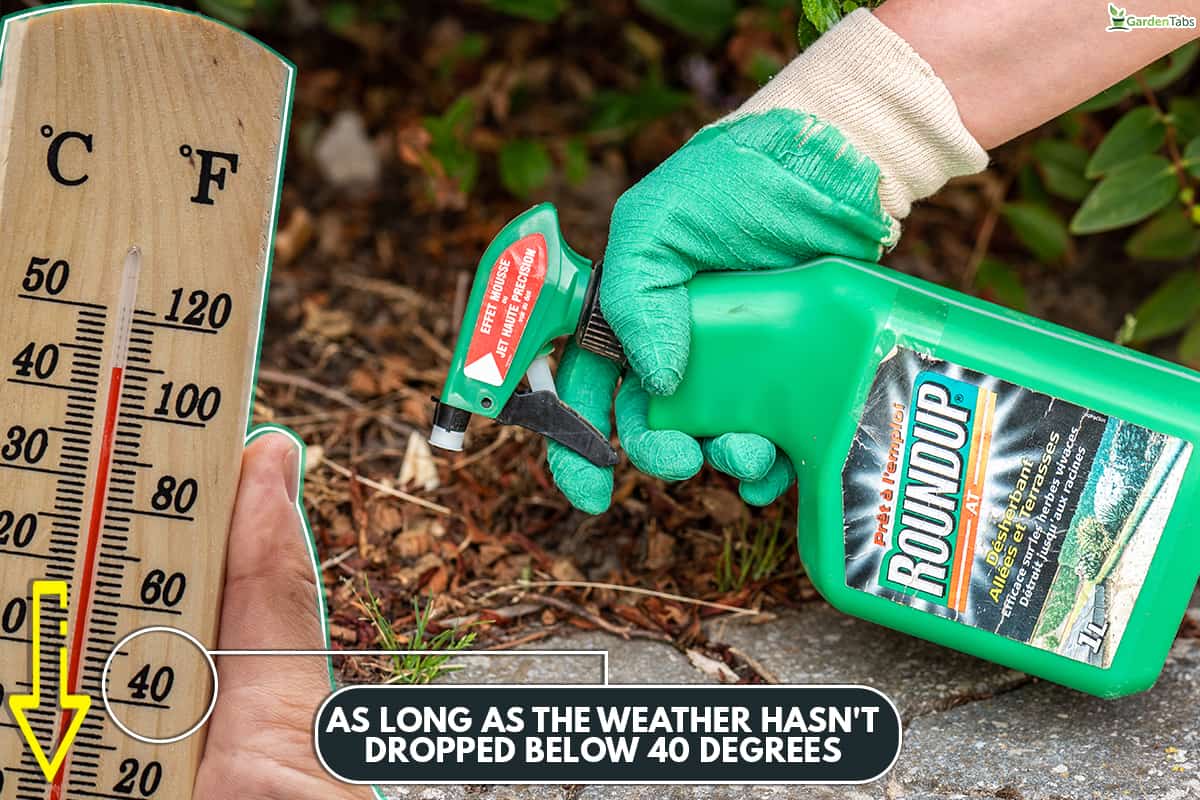
As long as the weather hasn't dropped below 40 degrees, you should be able to use Roundup in the fall successfully. Remember, your herbicide has an active ingredient called 'glyphosate,' which relies on stable weather to activate and work.
You want to aim for ambient temperatures of around 50+ degrees, but down to 40 should be okay. You should not spray Roundup in the fall if the daily highs are 40 degrees Fahrenheit.
Since the weather will drop far below that threshold in the evening, the weeds will stop growing, and your chemical won't work.
Chemicals have a funny way of operating: anything can affect them and cause their potency to weaken. A perfect example of this is when the climate gets too frigid.
Suppose it's been 24 hours since you applied Roundup, and the weather drops to 30 degrees. Although your herbicide had time to seep into the plant, your weed won't keep growing in such cold conditions.
Therefore, your product won't be able to kill it properly.
What's The Last Month Of The Year I Can Use Roundup?
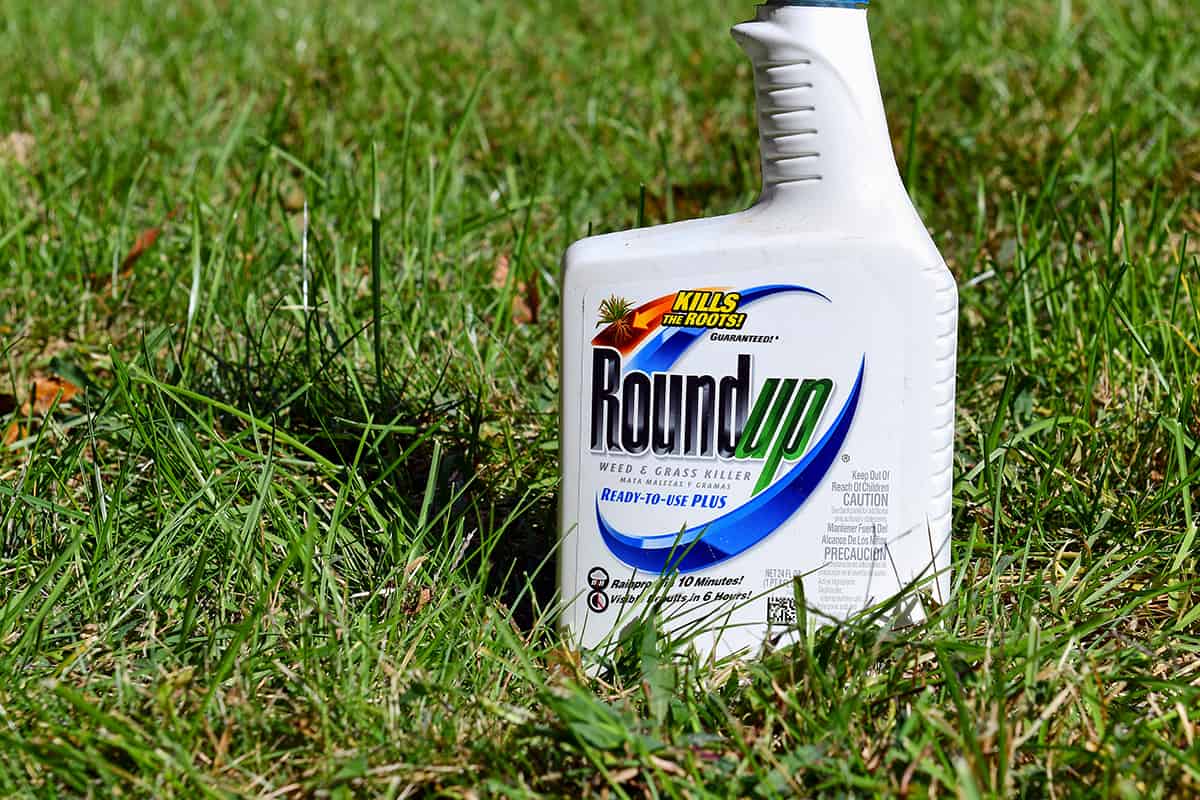
Depending on where you live, the final month you can spray herbicide could be November. Since winter kicks into high gear around December in most regions, you want to kill off weeds beforehand.
However, that comes down to your USDA growing zone and the current conditions. Some places don't get too chilly ever, so using Roundup might be a year-long privilege you have.
Especially in tropical gardens, you might be able to use Roundup 11-12 months of the year. Compared to someone in, let's say, Michigan or Illinois, that's a nice option.
On that note, you will likely run into hot 90+ degree weather in the summer if you can spray during the winter season. Therefore, your worry needs to switch to summer.
Remember, even though the sun is out that doesn't mean weeds are growing and able to be killed by your Roundup product.
To Finish It All Up
Whether you have weeds throughout your yard or want to switch to Roundup, it's always good to know the climate it requires to work. We found that Roundup works in weather between 40 and 85 degrees.
If the temperature rises or falls out of this threshold, your herbicide won't work correctly. That's because, in the super cold, weeds won't grow, and the chemical glyphosate won't activate.
In the heat, weeds go dormant, preventing your Roundup from penetrating and killing them. So, the milder the weather, the better your product should work!
While we have your attention, want to check out these helpful related garden posts below?
How To Use A Roundup Sprayer [And Troubleshooting If Not Working]
Does Roundup Kill Thistle? [Inc. Canadian, Russian, Scotch, & Milk]
Roundup 365 Vs. Extended Control: What's The Difference?
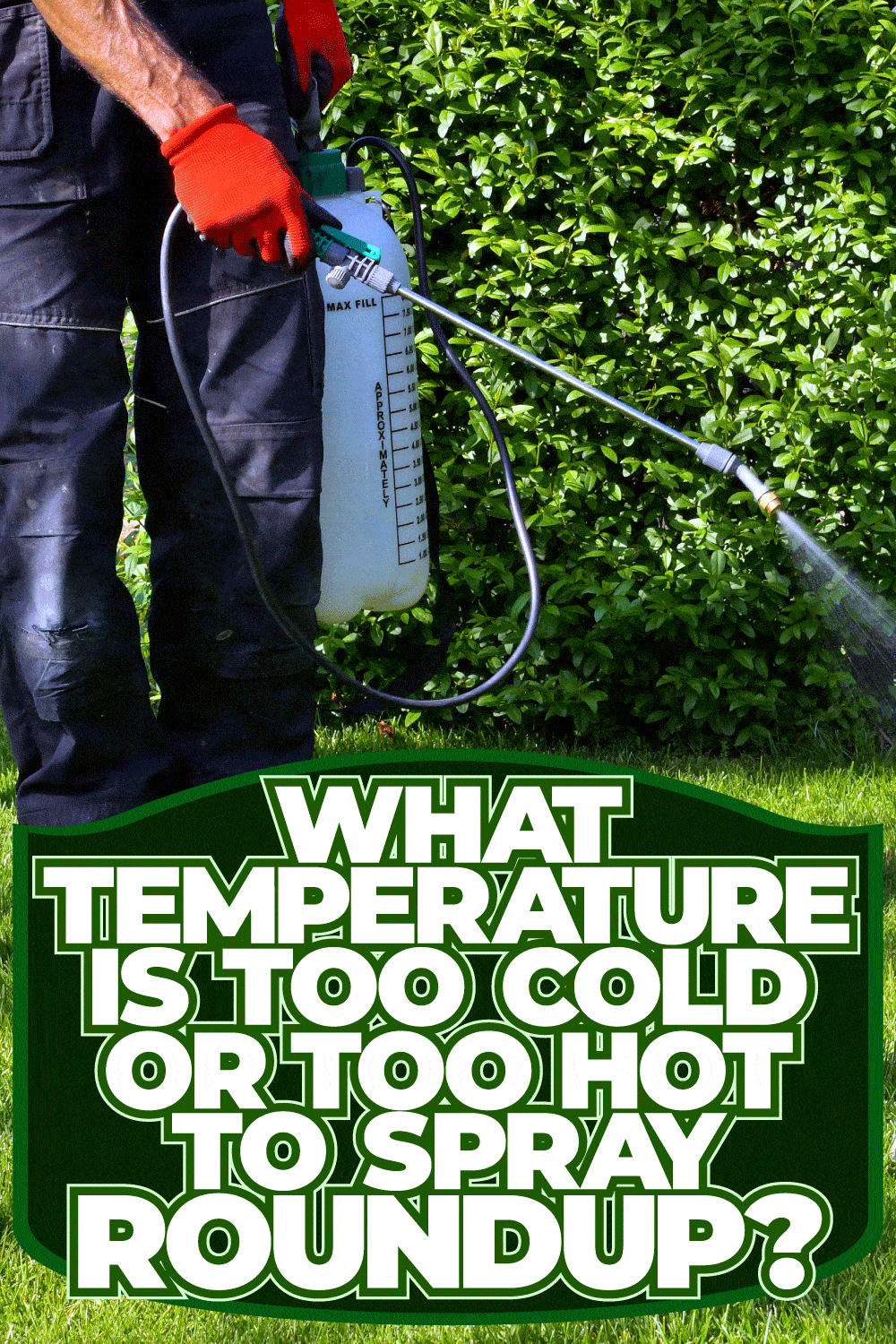

Thx SO much! I am a big fan of Roundup. I’m in N.GA, temps wildly fluctuate, weeds are already happy and it is dang Feb. But now I understand the way it operates, so will time my use better, wait until a dry day in 50s.